The best dog breeds for families
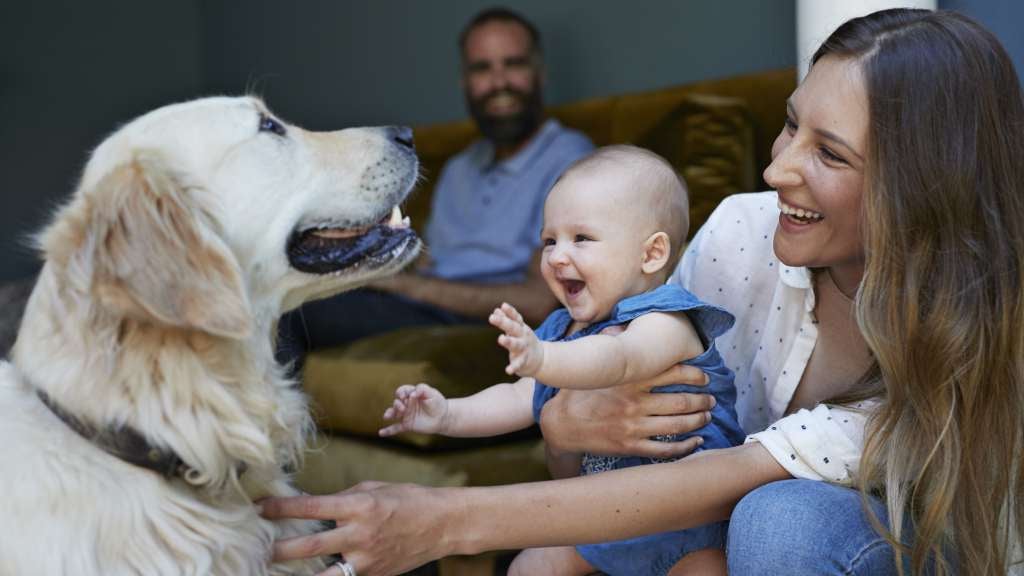
Nothing makes a house feel like a home than the addition of a furry friend.
In fact, dogs are the most popular pet for Australian families, with almost half (48%) of households owning at least one dog. Whether you’re looking for a jogging buddy, a cuddly couch potato or an easy-to-train companion, there’s a dog breed out there to suit your family’s needs and lifestyle.
But before you venture to your local pet shelter or dog breeder, it’s important to understand what type of dog is the right match for your household.
Wondering what makes an excellent family dog? Discover some of the best dog breeds for families, along with low-maintenance dogs, the best dogs for kids and even the best apartment dogs.
What to look for in the best family dog?
Bringing a dog into your family is a big decision, particularly with little ones in the picture. Buying a dog is typically a 10-year commitment (or even longer), and some dog breeds might not cope well in a busy household filled with young children.
Generally speaking, finding the best family dogs is all about matching a dog’s breed with your family’s dynamic. Even the top-rated family dogs can end up being a bad fit if their temperament, energy levels and size don’t suit your space or lifestyle.
When comparing breeds, it’s important to consider these factors if you’re looking for excellent family dogs:
- Temperament: Introducing babies or young kids to dogs can be a bit of a learning curve. While it’s important to teach little ones how to safely approach and interact with pets, it’s helpful to select a dog breed that is tolerant, relaxed and laidback. Look for dog breeds that are gentle, affectionate and eager to please - good family dogs can take the noise and chaos of kid's play time in their stride.
- Energy levels: How much time does your family realistically have to walk or exercise a dog? Between school drop-off, weekend sports matches and birthday parties, it can be a juggling act to fit in regular dog walks. When looking for the best dog breeds for families, consider how much exercise and mental stimulation the pooch will need. If your family only has time for one walk around the neighbourhood each day, consider a dog breed that’s happy to curl up on the couch instead.
- Grooming needs: If you’re looking for the best dogs with low maintenance needs, narrow your search to dog breeds with short coats. Unlike long-haired, non-shedding breeds (that require professional grooming every few weeks), dogs with short, thin coats will usually only need a weekly brush and regular baths to keep their skin healthy.
- Size: There’s a reason why so many parents are searching for ‘good family puppies’ on Google. With babies and young children in the picture, looking for puppies (rather than large, adult dogs) can seem like a safer choice. However, it’s important to check what size and weight a dog breed will be once they’re fully grown. If you’re living in a cosy space without a backyard, it might make sense to opt for smaller, low-maintenance dogs.
- Training ability: How easy is it to train this dog breed? For many families, selecting a dog that’s food-motivated, intelligent and eager to please will make the training process more manageable. Plus, it can be easier to train younger dogs or puppies - as they say, it can be tricky to teach an old dog new tricks.
Top 10 best dog breeds for families
1. Labrador Retriever
- Personality: Outgoing, goofy and friendly
- Size: Medium to large
- Weight: 25 to 36 kg
- Life span: Approx. 12 to 14 years
- Activity level: Very active
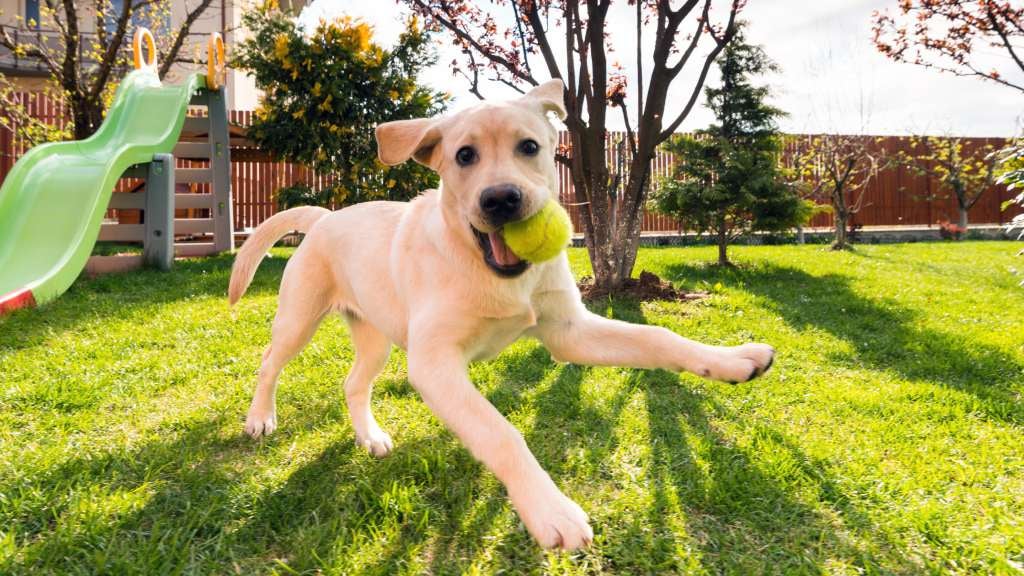
What better canine to start this list than a human’s ultimate best friend, the Labrador Retriever. The great outdoors is the perfect environment for Labs, who love nothing more than a big bounce around in wide open spaces. Plus, Labs are ideal if your family lives near the beach, as this is a dog who swims with the skills of a dolphin.
Keep in mind that Labs have lots of energy, so they are great for older toddlers. However, they are also happy to sit quietly and relax – though keep in mind that too much chill-out time can cause them to pile on the pounds, so be sure to monitor their diet.
2. Poodle
- Personality: Sweet, gentle and loyal
- Size: Three sizes (Standard, Miniature and Toy)
- Weight: 3 to 32 kg
- Life span: Approx. 10 to 18 years
- Activity level: Reasonably active
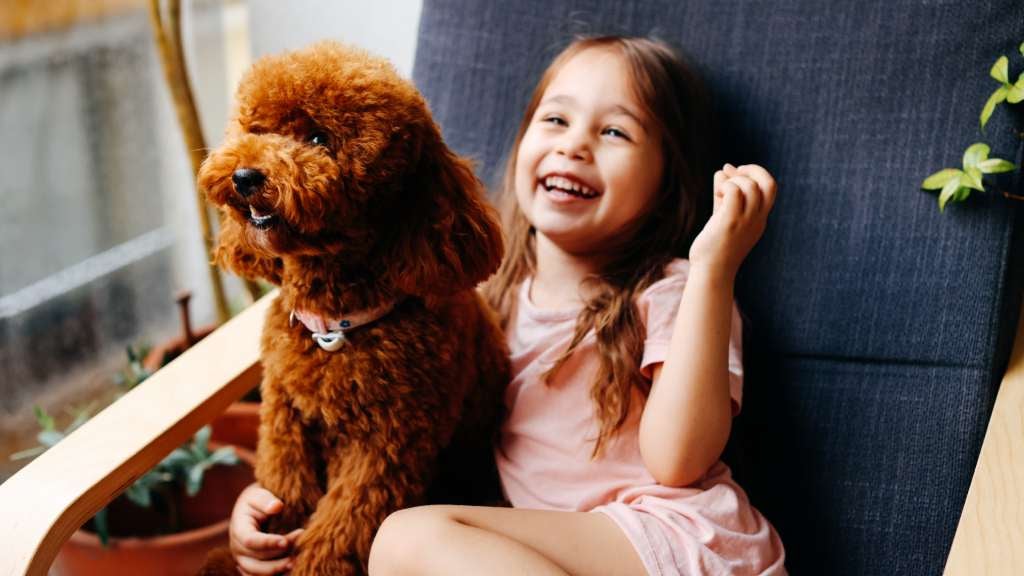
Known for being smart and gentle, poodles are great pets for children with allergies, as they shed minimal hair. Their good nature and patience make them a great playmate for children, and since they are rarely bothered you won’t have to be worried about the young ones climbing all over them. What is better than a stand-in nanny, pet and friend who doesn’t leave a fur ball mess behind?
3. Cavalier King Charles Spaniel
- Personality: Gentle, affectionate and happy
- Size: Small
- Weight: 5 to 8 kg
- Life span: Approx. 10 to 12 years
- Activity level: Not very active
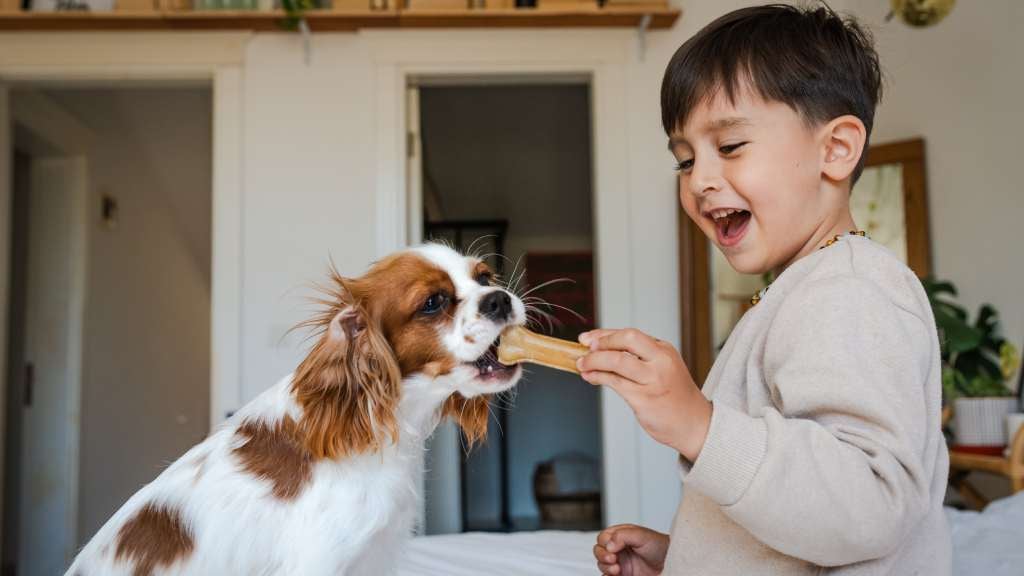
Cute and cuddly, Cavalier King Charles Spaniels are one of the best dog breeds for families of all ages. Not only are these spaniels gentle and patient but they forge strong bonds with their owners, making them ideal additions to any household. Plus, being on the smaller side means Cavaliers are well-suited to properties that are short on space, such as apartments or townhouses.
While this dog breed will happily engage in a game of tug-of-war, Cavaliers are equally as happy to lounge on the couch - just a short 30-minute daily walk is plenty for this docile dog breed.
4. Beagle
- Personality: Calm, gentle and intelligent
- Size: Medium
- Weight: 8 to 15 kg
- Life span: Approx. 12 to 15 years
- Activity level: Reasonably active
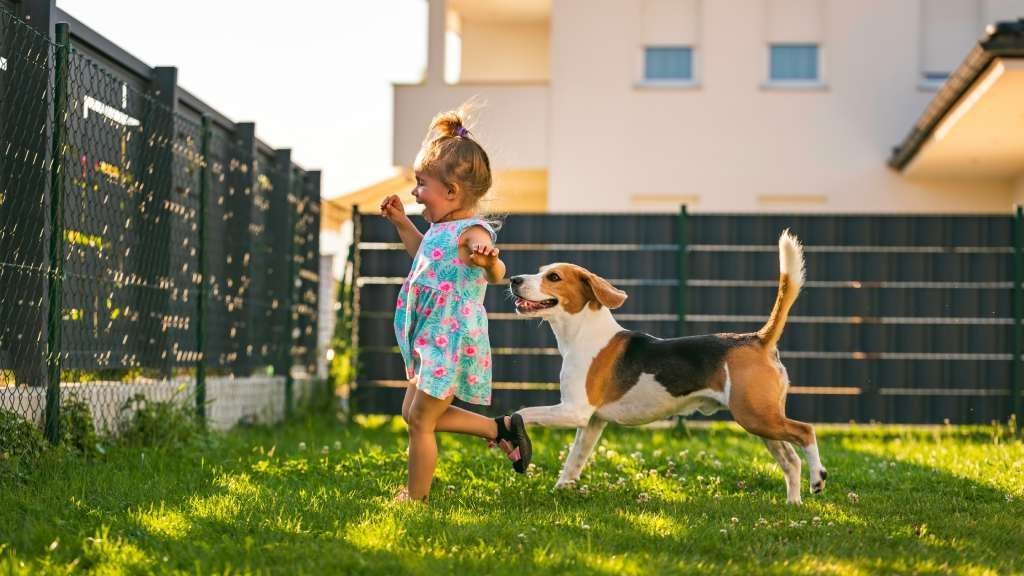
Beagles are well-suited to family life and are in their element, running around with the kids. With a placid temperament, they’re usually pretty easy-going. But, dangle a tempting scent in front of that super-sensitive nose, and they’re off. Make sure your backyard is secured with high fencing and well-maintained gates.
Plus, make sure to keep beagles entertained (particularly if you’re out of the home for long periods of time) with enrichment toys - such as snuffle mats and boredom-busting puzzles.
5. Golden Retriever
- Personality: Intelligent, friendly and devoted
- Size: Large
- Weight: 25 to 34 kg
- Life span: Approx. 10 to 12 years
- Activity level: Very active

With an enviable golden coat that’s soft to the touch, this is a dog you’ll want to hug and who won’t mind at all being hugged in return. As one of the most popular dogs in Australia, the Golden Retriever is an ideal match for young families. Expect a playful pooch who’s friendly, affectionate and loves swimming, too.
6. Staffordshire Bull Terrier
- Personality: Bold, affectionate and courageous
- Size: Medium
- Weight: 11 to 17 kg
- Life span: Approx. 12 to 14 years
- Activity level: Very active
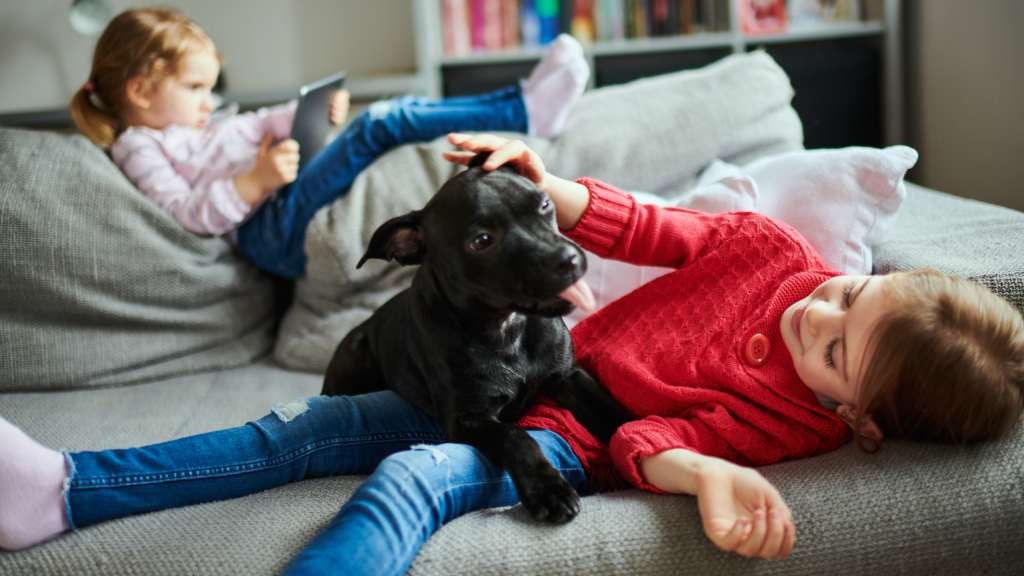
The loveable Staffy gets along with children like a house on fire and will jump to protect them if need be. In fact, this breed has earned the nickname ‘nanny dog’, famous for its loyalty. This is a sturdy dog well known for keeping a smile on their expressive face. Although they were bred as fighting dogs, with proper training, yours will be as loyal and obedient as any other dog. Plus, staffies love nothing more than being inside, curled up with the family.
7. Greyhounds
- Personality: Relaxed, affectionate and loving
- Size: Large
- Weight: 27 to 30 kg
- Life span: Approx. 10 to 14 years
- Activity level: Not very active
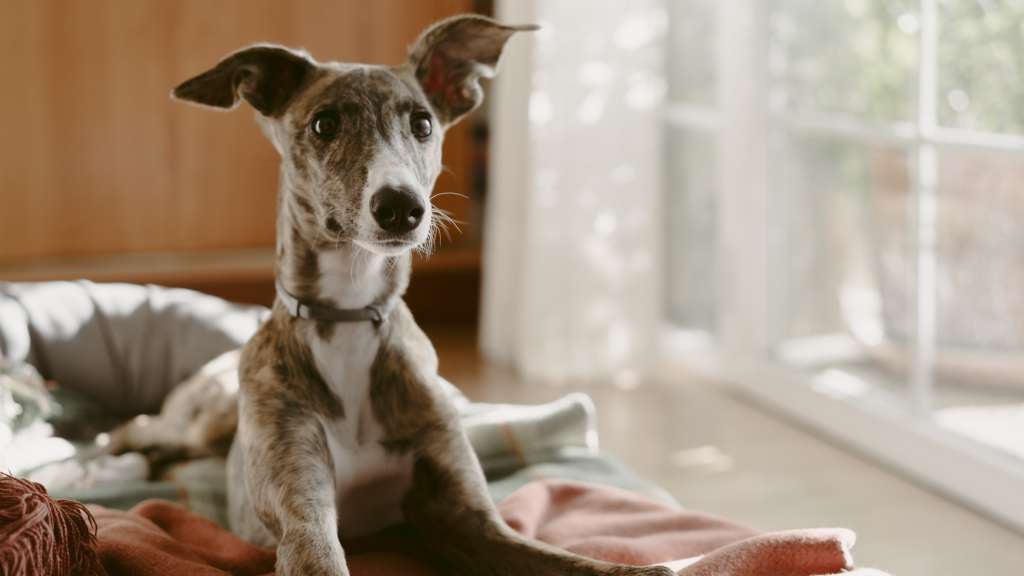
Think greyhounds need hours of exercise a day? Think again. Despite their use as racing dogs, greyhounds are gentle, quiet and, in many cases, a lazy dog breed well suited to families.
With a short coat, these dogs are low maintenance and have minimal grooming needs. Plus, with a sweet, laid-back temperament, greyhounds are ideal for families with kids. In fact, these hounds have low energy levels which makes them fantastic apartment dogs, too.
8. Jack Russell Terrier
- Personality: Alert, friendly and active
- Size: Small
- Weight: 6 to 8 kg
- Life span: Approx. 14 to 15 years
- Activity level: Very active
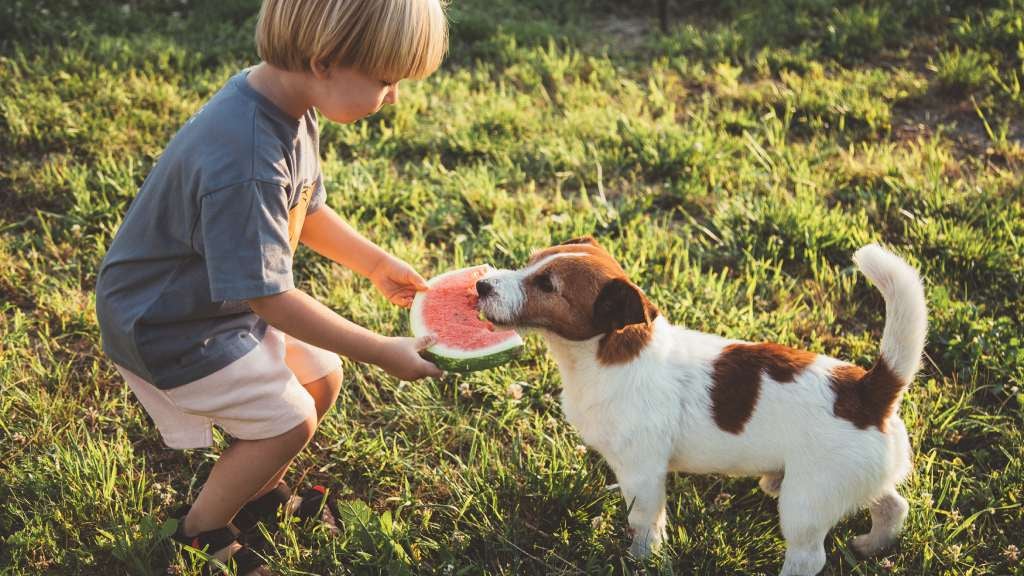
The Jack Russell might be small in stature, but this breed can have a big personality. Known for being quite hyperactive, this isn’t a dog for everyone. But they’ll make sure even the laziest family member gets up and plays outside. With a spirited temperament, Jack Russells are best suited to families with older kids over the age of eight.
9. Border Collie
- Personality: Smart, energetic and easy to train
- Size: Medium to large
- Weight: 14 to 20 kg
- Life span: Approx. 10 to 14 years
- Activity level: Very active
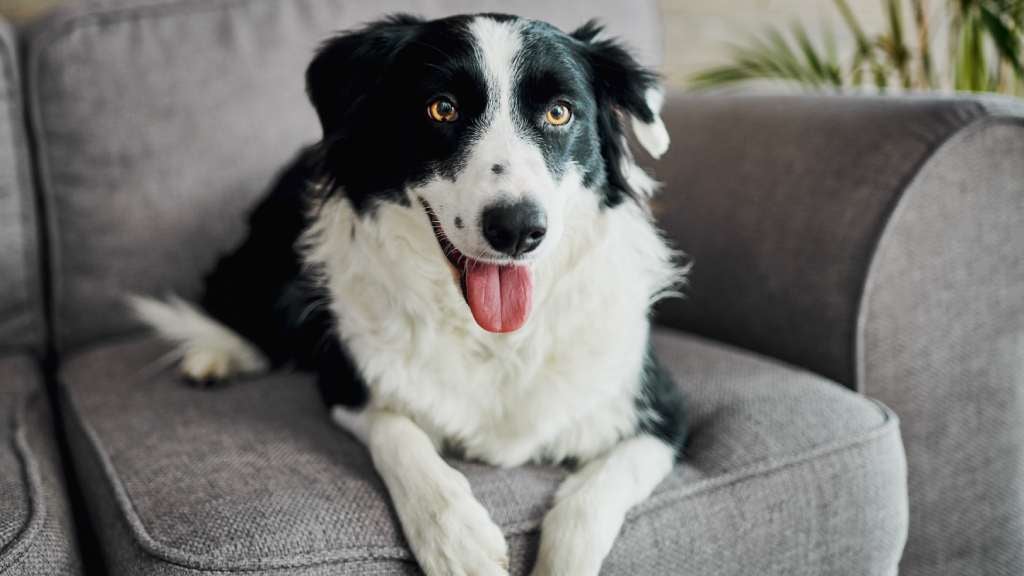
Looking for an active dog that will keep you company on your morning jog? The black and white beauty that is the beloved Border Collie can run up to 80 km a day and still have enough energy to chase you and a bone around the kitchen.
As an incredibly intelligent breed, Border Collies require some serious mental stimulation and plenty of daily exercise. If your family is dedicated to training this pooch, you’ll be rewarded with a loveable, loyal dog that’s eager to please.
10. Older dogs and rescue dogs
There’s nothing like giving a dog a bone or a home. Giving any dog a second chance at a happy life is one of the greatest things an Australian family can do. Research shows that many shelters in Australia are at capacity, meaning there are plenty of furry friends who are eagerly awaiting a new home.
Adopting an older dog can also be a good fit for households with kids. Adult dogs may already be trained and can have lower energy needs, particularly if you’re adopting a low-maintenance dog breed. Be sure to chat with the adoption or rescue centre to ensure your family selects a dog that will suit your lifestyle and household dynamic.
Still searching for the perfect dog breed for your family? Try the Dogs Australia breed matcher to assess which breed might be suited to your household.
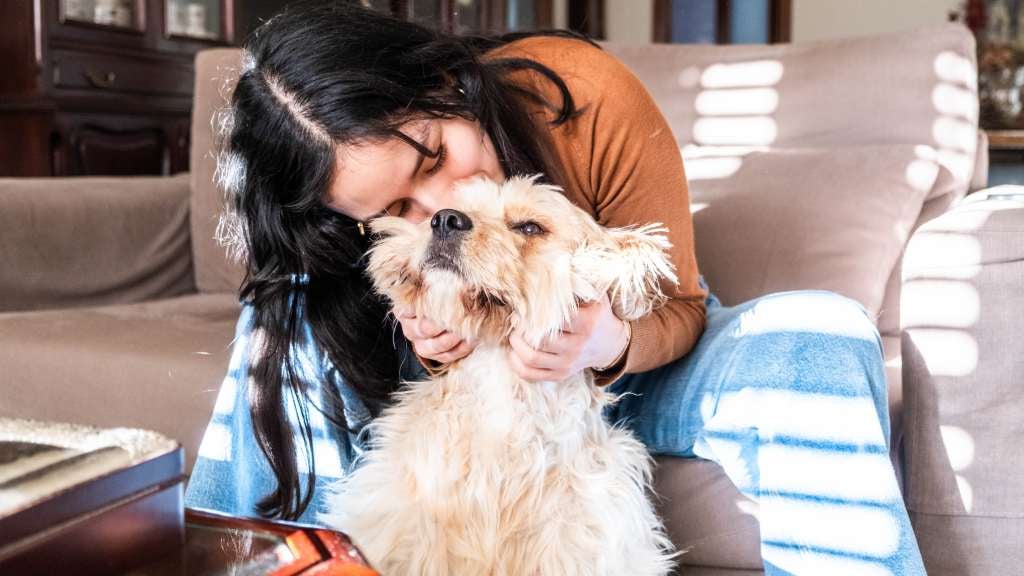
Choosing a dog that suits your family
Still searching for the perfect pooch match for your family? We chatted with Dr Tim Hopkins, Emergency Veterinarian at SASH Vets in Sydney, to find out which breeds make his recommended family dogs list.
Low maintenance dogs
When it comes to the best dogs with low maintenance needs, it can be helpful to look for breeds with low exercise needs. Plus, consider short-haired breeds that won’t require regular professional grooming to avoid frequent trips to the groomer.
“Personally, I love the Cavalier King Charles Spaniel. They’re reliable loving, happy and easy-going dogs that are the perfect fit for busy families with young kids.” - Dr Tim Hopkins
Best dogs for kids
Is your family wondering, “What type of dog should I have?”. If you’re looking for the best dogs for kids, it’s worth considering a loving, affectionate breed that can easily settle and adjust to your home environment.
As Dr Tim shares, “One of the most consistently child-friendly breeds would be the Labrador and Golden Retriever. They’re more robust, generally good-natured, affectionate, tolerant and easy to train, either because they’re eager to please or simply food-motivated.”
Best apartment dogs
As we’ve mentioned, greyhounds tend to be one of the most apartment-friendly dog breeds. As Dr Tim explains, “My favourite description of the breed is: ‘cat software, dog hardware’”. With a placid temperament and only short bursts of exercise needed, greyhounds are ideal for busy families.
Looking for a dog that’s happy to be home alone? “While not technically a breed, senior dogs are often better at spending time alone and they’re a known quantity in terms of their behaviour and temperament,” shares Dr Tim.
Attuned to neurodiversity
Need a dog that will fit in with your family’s neurodiverse needs? Assistance dogs can improve communication skills, confidence and independence in children and adults living with neurodiversity, such as autism and ADHD.
“Assistance Dogs Australia is an amazing resource for anyone considering a dog in a neurodiverse family,” says Dr Tim. “They can help to navigate what type of dog to look for, and the options for sourcing a dog.”
Good for active, outdoorsy families
If your family is high-energy and constantly on the go, then an active dog can be a sensible choice. “Most families are not able to satisfy the exercise requirements of a working dog like a Kelpie or Border Collie,” says Tim.
“If you’re in the minority [of families] with the ability to devote at least two hours a day to their exercise, they can make hugely rewarding family dogs. They are super intelligent, trainable and loyal – just don’t expect them to entertain themselves!”
Healthy dog breeds
Due to their breeding, some dogs suffer from heritable diseases that may make your vet bills pile up.
“Most people would be aware of the significant breathing problems we see in the brachycephalic breeds, including the Bulldog, Pug and Boston Terrier, caused by Brachycephalic Obstructive Airway Syndrome,” says Tim. “While every dog is an individual, and these breeds can make fantastic pets, the risk of breathing difficulties is something all prospective owners should be aware of.”
Crossbreeds are worth considering if you want to avoid significant health issues. “If you want to save yourself some heartache and avoid vet bills, you should consider a crossbreed dog,” says Tim.
"Mixed-breed dogs (i.e. any cross between any purebred dog) could be healthier for any given aspect than the average of their parents.” - Dr Tim Hopkins
Protecting the newest member of your family
After bringing a dog into your family, you want to do everything you can to keep them safe, happy and healthy. While you can’t predict the future, you can take proactive steps to give them the care they deserve to stay well.
Whatever breed you choose, consider pet insurance in case your dog suffers an injury or illness. Taking out Real Pet Insurance is one simple thing you can do to help protect your pet from the unexpected.
5 Mar 2025

Dr Tim Hopkins
SASH Northern Beaches Emergency Veterinarian and Operations Manager
Dr Tim Hopkins is an Emergency Veterinarian and Operations Manager at SASH Northern Beaches. A University of Sydney graduate with First Class Honours, Tim began his career at SASH, completing his internship in 2008. He then spent two years in the UK, working as a general practice and emergency veterinarian in London.
In 2011, he earned a Master of Science in Wild Animal Health from the Royal Veterinary College and went on to work as a wildlife veterinarian at the Institute of Zoology, studying diseases impacting wildlife populations. Since returning to Australia in 2016, Tim has worked in emergency hospitals and the RSPCA, bringing a wealth of experience to his current role.